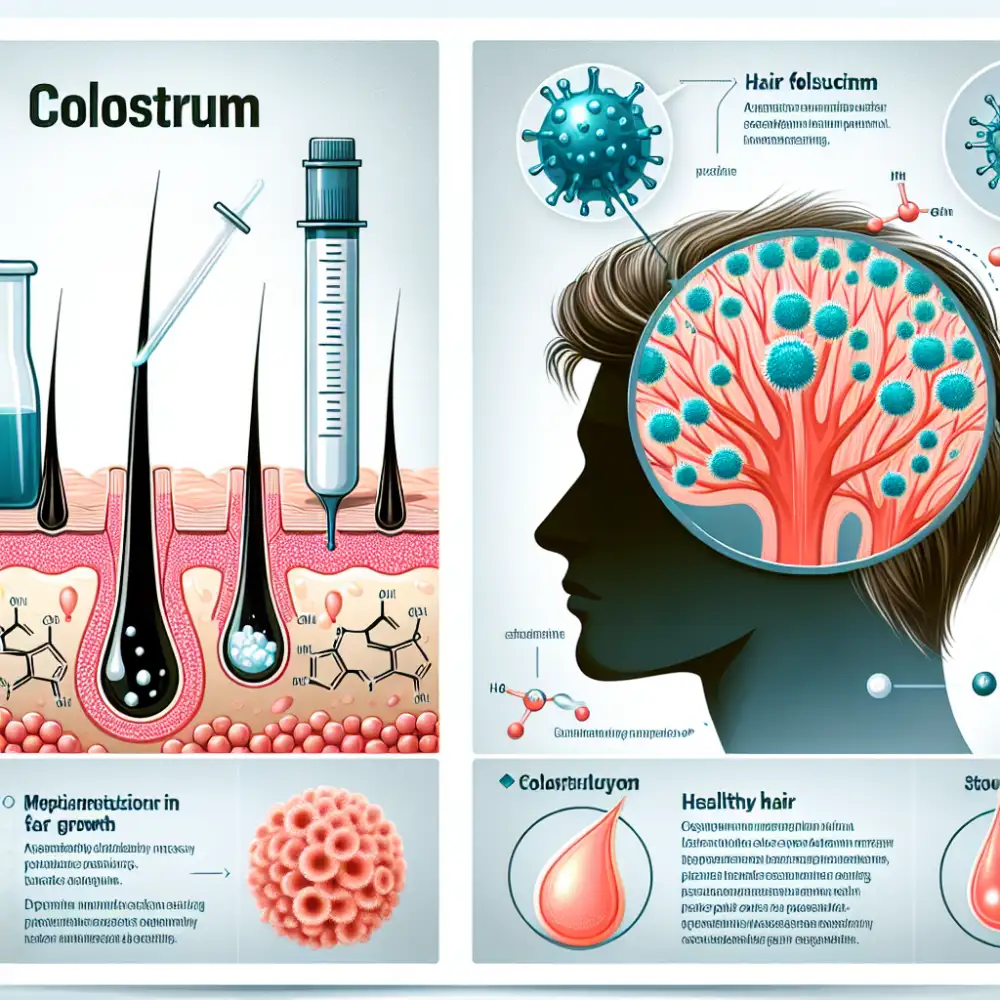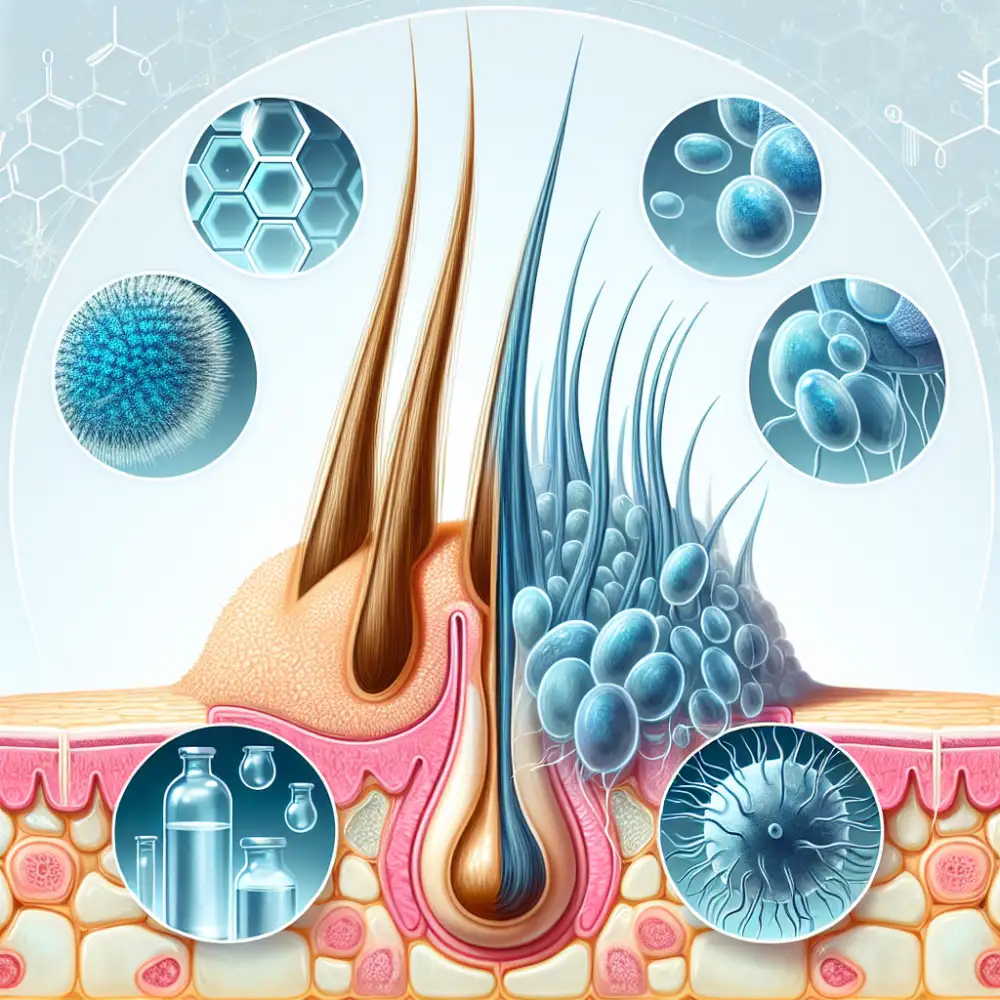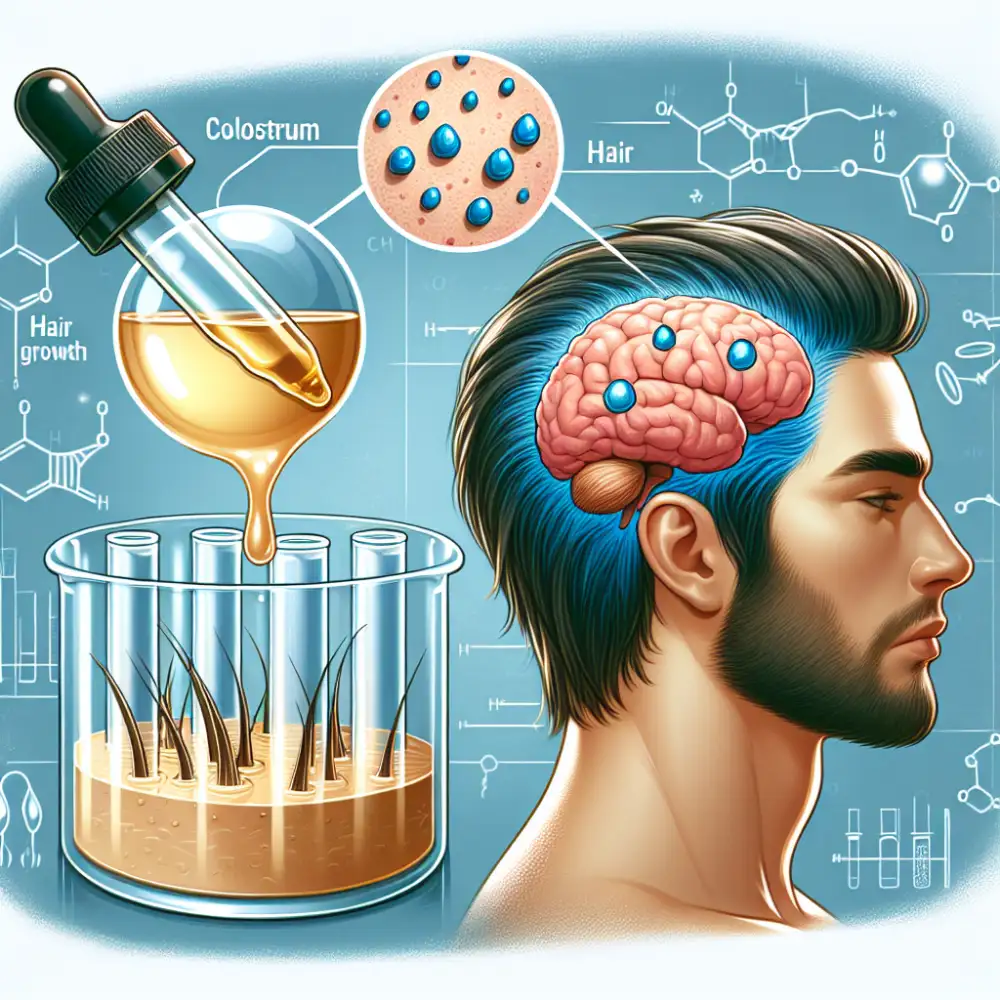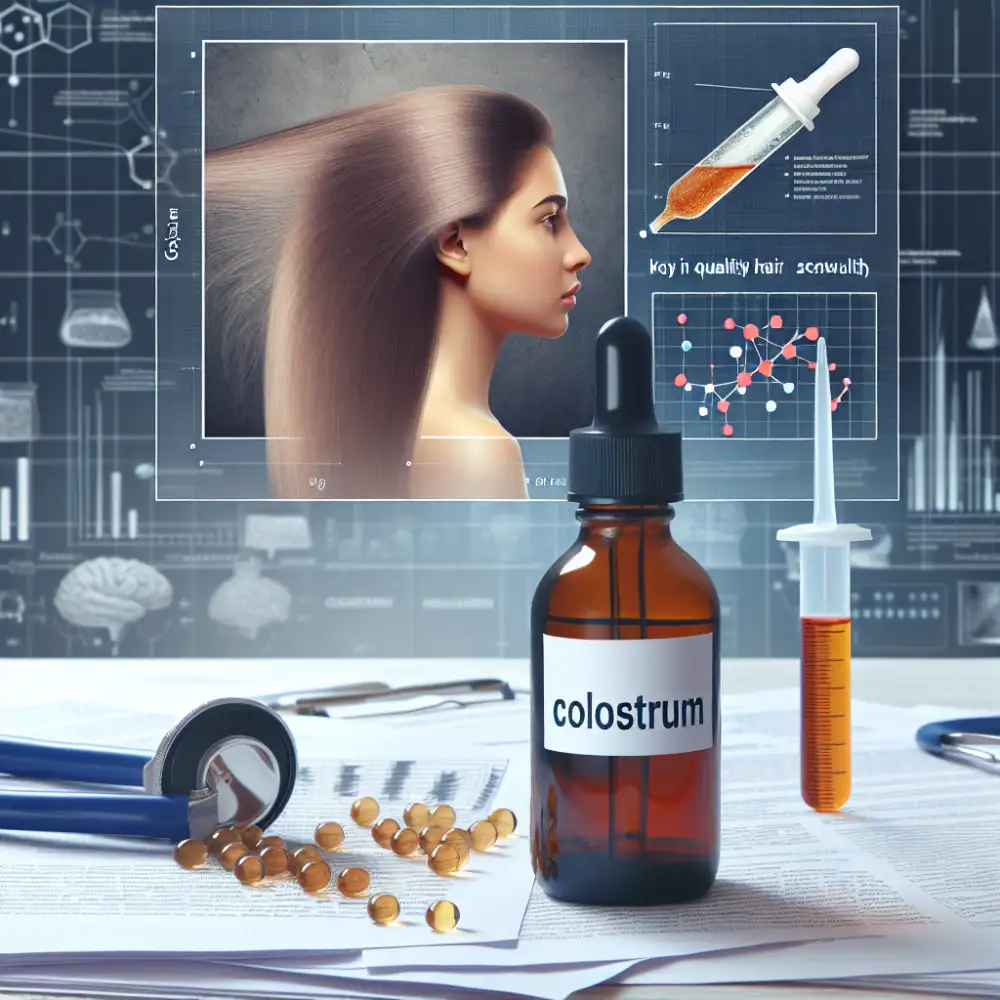Does Colostrum Make Your Hair Grow?

What is Colostrum?
Colostrum is the first milk produced by mammals after giving birth, including humans. It's packed with essential nutrients, antibodies, and growth factors that support the newborn's immune system and overall development. While colostrum is primarily known for its benefits in infants, there's growing interest in its potential applications for adults, including hair growth.
Colostrum contains growth factors like insulin-like growth factor 1 (IGF-1) and transforming growth factor-beta (TGF-β), which are known to play a role in hair follicle development and growth. IGF-1 stimulates cell growth and proliferation, potentially promoting the growth of hair follicles. TGF-β helps regulate the hair growth cycle, ensuring the transition between growth and resting phases.
Additionally, colostrum is rich in amino acids, the building blocks of protein, which is essential for hair structure and growth. A deficiency in certain amino acids can lead to hair loss. However, it's important to note that research on colostrum and hair growth is still limited. While some studies suggest potential benefits, more research is needed to confirm its effectiveness and determine optimal dosages.
If you're considering using colostrum for hair growth, consult with a healthcare professional to discuss potential benefits, risks, and appropriate usage. They can help you make an informed decision based on your individual health status and needs. Remember that colostrum is a dairy product, so individuals with dairy allergies or intolerances should avoid it.
Nutritional Powerhouse
Colostrum, the first milk produced after childbirth, is a nutritional powerhouse packed with bioactive compounds that support the newborn's immune system and overall development. Its potential benefits have sparked interest in its use for various health concerns, including hair growth.
Colostrum is naturally rich in growth factors, such as insulin-like growth factors (IGFs) and transforming growth factor-beta (TGF-β). These growth factors play crucial roles in cell growth, proliferation, and differentiation, processes essential for hair follicle development and hair growth.
Research on colostrum's effects on hair growth is limited. Some studies suggest that topical application of colostrum-based products may improve hair growth in individuals experiencing hair loss. For instance, a study published in the Journal of Cosmetic Dermatology found that a topical lotion containing colostrum extract increased hair growth and density in men with androgenetic alopecia, commonly known as male pattern baldness.
While these preliminary findings are promising, more research is needed to understand the mechanisms by which colostrum may influence hair growth and to determine its efficacy compared to other hair loss treatments.
It's important to note that individual responses to colostrum may vary. Factors such as the concentration of bioactive compounds in the colostrum source, the method of application, and the individual's overall health can influence its effectiveness.

If you're considering using colostrum for hair growth, consult with a healthcare professional to discuss its potential benefits and risks, as well as its suitability for your specific situation. They can provide personalized advice and help you make informed decisions about your hair care regimen.
Potential Benefits for Hair
Colostrum, the first milk produced after childbirth, is a powerhouse of nutrients essential for a newborn's growth and development. It's rich in antibodies, growth factors, and immune-boosting compounds. While its benefits for infants are well-documented, research on colostrum's potential for hair growth is limited and inconclusive.
Some proponents believe that the growth factors present in colostrum, such as insulin-like growth factor (IGF-1) and transforming growth factor (TGF-β), could stimulate hair follicles and promote hair growth. IGF-1 is known to play a role in hair follicle development and cycling, while TGF-β is involved in cell growth and differentiation.
However, there's no scientific evidence to confirm that topical application or oral consumption of colostrum can directly lead to hair growth in humans. Existing studies primarily focus on colostrum's benefits for wound healing, gut health, and immune function.
More research is needed to understand the potential effects of colostrum on hair growth. If you're experiencing hair loss or thinning, it's essential to consult a dermatologist or trichologist to determine the underlying cause and explore evidence-based treatment options.
Growth Factors and Hair Follicles
Growth factors are like chemical messengers that tell your cells to grow and divide. They’re super important for healing injuries and maintaining healthy tissues, including your hair follicles. Hair follicles are like tiny pouches in your skin where hair grows from.
Colostrum, the first milk produced after giving birth, is a rich source of growth factors. These growth factors, including epidermal growth factor (EGF) and insulin-like growth factor (IGF-1), are known to stimulate hair growth. EGF can increase the size of hair follicles, leading to thicker, longer hair. IGF-1 promotes the growth phase of the hair cycle, resulting in faster hair growth.
While colostrum is a powerhouse of nutrients and growth factors, research specifically on colostrum and hair growth is limited. Some small studies suggest that topical application of colostrum-based products might improve hair growth in people experiencing hair loss. However, more research is needed to confirm these findings and determine the effectiveness and safety of colostrum for hair growth.

| Feature | Colostrum | Minoxidil (Rogaine) |
|---|---|---|
| Mechanism for hair growth | May contain growth factors that could potentially stimulate hair follicles, but research is very limited. | FDA-approved medication that widens blood vessels and prolongs the growth phase of hair follicles. |
| Scientific evidence for hair growth | Limited studies on specific hair growth, mostly anecdotal evidence. | Numerous studies demonstrate effectiveness in treating male and female pattern baldness. |
| Availability | Available as a supplement in various forms (powder, capsules). | Available over-the-counter and in stronger prescription forms. |
Studies and Evidence
While colostrum is recognized for its potent combination of nutrients and immune-boosting properties, scientific research specifically investigating its effects on hair growth remains limited. There are no large-scale studies directly linking colostrum consumption to increased hair growth in humans.
Some proponents suggest that the growth factors present in colostrum, such as insulin-like growth factor (IGF-1) and transforming growth factor (TGF-β), might play a role in stimulating hair follicles. These growth factors are known to be involved in cellular growth and development, and they have been studied for their potential benefits in wound healing and tissue repair. However, it is essential to note that the concentration of these growth factors in commercially available colostrum supplements can vary significantly, and the bioavailability of these growth factors when taken orally is not well-established.
Furthermore, hair growth is a complex process influenced by multiple factors, including genetics, hormones, nutrition, and overall health. Attributing hair growth solely to colostrum supplementation would be an oversimplification. More research is needed to determine whether colostrum, and if so, what specific components of colostrum, have a direct impact on hair growth in humans.
How to Use Colostrum
Colostrum is the first milk produced by mammals after giving birth, and it's rich in nutrients that support the newborn's immune system and growth. While colostrum is known for its benefits when ingested, there's limited scientific evidence to suggest that it directly promotes hair growth when applied topically or consumed.
Some proponents suggest that the growth factors present in colostrum, like insulin-like growth factor (IGF-1) and transforming growth factor (TGF-β), might stimulate hair follicles. However, more research is needed to determine if these growth factors can be absorbed through the scalp or if they have any significant impact on hair growth when taken orally.


If you're considering using colostrum for hair growth, it's essential to consult with a dermatologist or trichologist. They can assess your individual hair loss situation, determine the underlying cause, and recommend evidence-based treatments.
Remember, maintaining a healthy lifestyle with a balanced diet, stress management, and proper hair care practices is crucial for supporting overall hair health. While some people might explore colostrum as a potential option, it's essential to approach it with realistic expectations and prioritize scientifically supported treatments for hair loss.
Recommended Dosage
There is no established recommended dosage of colostrum specifically for hair growth. While some anecdotal evidence suggests potential benefits, scientific research in this area is limited.
Colostrum is generally considered safe for consumption in healthy adults. However, it is essential to consult with a healthcare professional before taking any new supplement, including colostrum, especially if you have any underlying health conditions, allergies, or are pregnant or breastfeeding.
Dosage recommendations for colostrum supplements can vary depending on factors such as the product's concentration, form, and individual health status. It's crucial to follow the instructions provided by the manufacturer and your healthcare provider's guidance.
Potential Side Effects
There's limited research on the long-term effects of colostrum supplementation, particularly concerning hair growth. Pregnant or breastfeeding women should consult their healthcare provider before using colostrum supplements. While some anecdotal evidence suggests colostrum might promote hair growth, scientific research in this area is limited and inconclusive.
Who Should Avoid Colostrum
While colostrum offers various potential benefits, its role in hair growth is not definitively established. Some proponents suggest that the growth factors present in colostrum might support hair follicle health, but scientific evidence to confirm this specific claim is limited.
If you are considering using colostrum, particularly bovine colostrum supplements, it's crucial to consult with your doctor. This is especially important for individuals with:
Allergies to dairy products: Colostrum is derived from milk and contains lactose and casein, potentially triggering allergic reactions in susceptible individuals.

Sensitivity to growth hormones: Colostrum naturally contains growth factors, which might not be suitable for everyone, especially those with hormone-sensitive conditions.
Pregnant or breastfeeding women: The safety of colostrum supplementation during pregnancy or lactation hasn't been extensively studied.
Individuals with pre-existing medical conditions: If you have any underlying health concerns, it's essential to discuss colostrum use with your healthcare provider to avoid potential interactions or complications.
Remember, while some individuals might explore colostrum for its purported benefits, it's not a guaranteed solution for hair loss or a substitute for proven hair growth treatments. Always prioritize evidence-based approaches and consult your doctor for personalized advice.
Talk to Your Doctor
If you're considering using colostrum for hair growth, the first and most crucial step is to talk to your doctor. While colostrum is generally safe for consumption, it's essential to discuss this with your healthcare provider for several reasons.
They can help determine if colostrum is appropriate for you based on your medical history, current medications, and any underlying health conditions. Additionally, they can advise you on the appropriate dosage, as there are no established guidelines for using colostrum for hair growth.
Remember, while some anecdotal evidence suggests potential benefits, scientific research on colostrum's effectiveness in promoting hair growth is limited. Your doctor can help you understand the potential risks and benefits and guide you toward evidence-based treatments for hair loss or hair growth concerns.
Published: 26. 06. 2024
Category: Health



